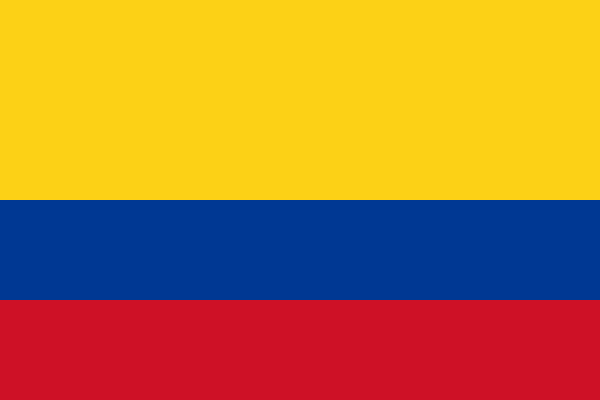Government group
In 2002, Álvaro Uribe of the Colombia First party was elected president with 53.1 per cent of the vote, breaking the two-party system that ruled the country since 1958, with the promise of ending the armed conflict that haunts the country since 1964 by strengthening the Armed Forces.[3] In 2006, he managed to change the Constitution in order to run for a second consecutive term. After a practically mute campaign, Uribe won the election with 62.2 per cent of the vote, followed by Carlos Gaviria of the Alternative Democratic Pole with a distant 22 per cent.
In 2007, Luis Guillermo Giraldo, leader of the pro-Uribe Party of the U, announced he would create the "promoters’ committee", a group charged with gathering signatures to call a referendum on whether Uribe should be allowed to run for a third term in office. In September 2009, Congress approved the referendum bill in a late-night voting boycotted by members of the opposition. On February 26, 2010, the Constitutional Court voted against the referendum bill.Immediately after the ruling, former defence minister Juan Manuel Santos confirmed that he would become a presidential candidate. Other Uribist candidate is Germán Vargas Lleras of the Radical Change party. Former Colombian ambassador to the United Kingdom, Noemí Sanín, and former agriculture minister Andrés Felipe Arias, two of the closest Uribe allies, are seeking nomination by the Conservative Party.
of the U, announced he would create the "promoters’ committee", a group charged with gathering signatures to call a referendum on whether Uribe should be allowed to run for a third term in office. In September 2009, Congress approved the referendum bill in a late-night voting boycotted by members of the opposition. On February 26, 2010, the Constitutional Court voted against the referendum bill.Immediately after the ruling, former defence minister Juan Manuel Santos confirmed that he would become a presidential candidate. Other Uribist candidate is Germán Vargas Lleras of the Radical Change party. Former Colombian ambassador to the United Kingdom, Noemí Sanín, and former agriculture minister Andrés Felipe Arias, two of the closest Uribe allies, are seeking nomination by the Conservative Party.
Opposition group
The main opposition candidates are Rafael Pardo of Liberal Party and Gustavo Petro of the Alternative Democratic Pole. Álvaro Leyva Durán, a Uribe opponent, is seeking the presidential nomination by the Conservative Party. Former Medellín mayor Sergio Fajardo, neither an ally nor opponent to Uribe, is an independent candidate.
On October 2, 2009, the Green Party was officially created. It will nominate its presidential candidate on a primary ballot that will take place on March 14, 2010, the same day as the legislative election. The contenders are three former Bogotá mayors: Enrique Peñalosa, Antanas Mockus, and Luis Eduardo Garzón. The Greens seek to be a moderate force in what they called "a polarized" political situation, calling themselves "Post-Uribists."
In 2002, Álvaro Uribe of the Colombia First party was elected president with 53.1 per cent of the vote, breaking the two-party system that ruled the country since 1958, with the promise of ending the armed conflict that haunts the country since 1964 by strengthening the Armed Forces.[3] In 2006, he managed to change the Constitution in order to run for a second consecutive term. After a practically mute campaign, Uribe won the election with 62.2 per cent of the vote, followed by Carlos Gaviria of the Alternative Democratic Pole with a distant 22 per cent.
In 2007, Luis Guillermo Giraldo, leader of the pro-Uribe Party
 of the U, announced he would create the "promoters’ committee", a group charged with gathering signatures to call a referendum on whether Uribe should be allowed to run for a third term in office. In September 2009, Congress approved the referendum bill in a late-night voting boycotted by members of the opposition. On February 26, 2010, the Constitutional Court voted against the referendum bill.Immediately after the ruling, former defence minister Juan Manuel Santos confirmed that he would become a presidential candidate. Other Uribist candidate is Germán Vargas Lleras of the Radical Change party. Former Colombian ambassador to the United Kingdom, Noemí Sanín, and former agriculture minister Andrés Felipe Arias, two of the closest Uribe allies, are seeking nomination by the Conservative Party.
of the U, announced he would create the "promoters’ committee", a group charged with gathering signatures to call a referendum on whether Uribe should be allowed to run for a third term in office. In September 2009, Congress approved the referendum bill in a late-night voting boycotted by members of the opposition. On February 26, 2010, the Constitutional Court voted against the referendum bill.Immediately after the ruling, former defence minister Juan Manuel Santos confirmed that he would become a presidential candidate. Other Uribist candidate is Germán Vargas Lleras of the Radical Change party. Former Colombian ambassador to the United Kingdom, Noemí Sanín, and former agriculture minister Andrés Felipe Arias, two of the closest Uribe allies, are seeking nomination by the Conservative Party.Opposition group
The main opposition candidates are Rafael Pardo of Liberal Party and Gustavo Petro of the Alternative Democratic Pole. Álvaro Leyva Durán, a Uribe opponent, is seeking the presidential nomination by the Conservative Party. Former Medellín mayor Sergio Fajardo, neither an ally nor opponent to Uribe, is an independent candidate.
On October 2, 2009, the Green Party was officially created. It will nominate its presidential candidate on a primary ballot that will take place on March 14, 2010, the same day as the legislative election. The contenders are three former Bogotá mayors: Enrique Peñalosa, Antanas Mockus, and Luis Eduardo Garzón. The Greens seek to be a moderate force in what they called "a polarized" political situation, calling themselves "Post-Uribists."
http://www.globalexchange.org/countries/americas/colombia/elections2010.html



No hay comentarios:
Publicar un comentario